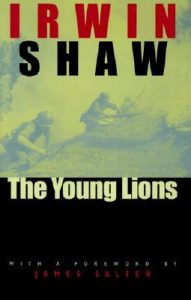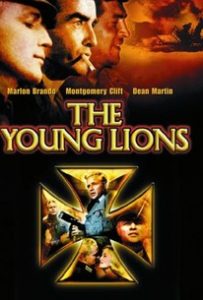A Few More Reflections on Irwin Shaw’s “The Young Lions”
 Having posted on my The Young Lions read last week, I realized that I had a few more “terribly important observations” to share, so here we are for “m’thoughts”, Take 2. 🙂
Having posted on my The Young Lions read last week, I realized that I had a few more “terribly important observations” to share, so here we are for “m’thoughts”, Take 2. 🙂
These observations are a little more eclectic, one coming from a writer’s/writing perspective and the other two relating to social observation from an historical perspective. Bearing in mind that The Young Lions was contemporary fiction in its time, being a book about WW2 published in 1949, but current readers will view it through the lens of history.
Uncanny Prescience
In that respect, I noted last week that some of what we observe currently in the US social and political situation is predicted in the book, through a character called Colonel Pavone:
“I am not very interested in the war,” Pavone was saying. … “I am more interested in the peace later…because that issue is still in doubt. … And I am afraid that America will be isolated, hated, backward, we will all be living there like old maids in a lonely house in the woods, locking the doors, looking under the beds, with a fortune in the mattress, not being able to sleep…[thinking]…the murderers are breaking into kill us and take our treasure.”
I couldn’t help finding this somewhat prescient in terms of a number of current issues, not least the response to Covid 19, but also in terms of gun control and immigration—although the latter is certainly not restricted to the US.
Pervasive Sexism
I also noted that: “One of the themes in the book…is that of anti-semitism in US society and in the military.” This is not surprising, given the era and the immediate aftermath of WW2, and it makes for compelling reading.
Yet although it was definitely not a theme of the book, as a 21st century reader I couldn’t help noticing the constant and casual sexism whenever I was reading the point-of-view of Michael, one of the three leading characters. Michael is oldest of the three main characters, although still in his twenties, with a pre-Army career in show business. He is divorced early in the book and has a number of affairs both before and after his marriage. It’s not the affairs, as such, but the constant “internal” disparagement and dismissal of women that leapt out at me as a reader. For example:
“Far off, a single battery spoke into the subsiding sky. Probably, thought Michael, it is one of the women’s batteries, coming, like women, a little late for the raid, but showing their intentions are of the best.”
Well, I suppose “their intentions are of the best”—but otherwise it’s almost breathtakingly dismissive and condescending, especially considering the significance of women’s contribution, from farms and factories to Bletchley Park, to winning the war. And this example is only one among very many…

The Hollywood version…
Nonetheless, the disparagement and dismissal occurs almost exclusively in Michael’s point-of-view. Noah’s wife, Hope, is portrayed as a strong and intelligent character, and he is devoted to her, so it is perhaps not surprising that the same reflections don’t arise. They also don’t arise in Christian’s interactions with women, although these chiefly comprise his affair with his superior officer’s wife. She is an interesting character, if not a positive one—but as this is true of the majority of those in the book, most of whom are men, I don’t think I can call it sexism.
So as a reader and a writer myself, I am left wondering if Michael’s disparaging and/or condescending animadiversions on women are a reflection of his character, which in turn reflect how a great many men at the time thought—and some or many may still do, as the #MeToo movement has made clear. If you have read the book yourself, or do read it subsequently, you will have to let me know what you think. 🙂
Whatever the case may have been for Irwin Shaw, Michael’s attitudes toward women are not examined, or their effects explored, in the same way as those of antisemitism: both in shaping Noah and in the significance of the concentration camp at the end of the book. In that sense the “everyday sexism” does come across as a reflection of the era, one that we see expressed through Michael because he is the philanderer and “ladies man.” It certainly makes for interest reading, though, 70 plus years later.
The ‘Prologue’ That Doesn’t Fit
As an author, I was struck by the extent to which the first chapter doesn’t “fit” with the rest of the book. It isn’t called a prologue, but it serves as one, for a number of reasons. As posted last week, The Young Lions follows three point-of-view characters: Christian, Noah, and Michael, from 1938 until 1945. The rest of the book is told exclusively through, and from, the points-of-view of these three characters.
The exception is the first chapter. Although we first meet Christian in it, the point-of-view character is Margaret Freemantle, who we later meet again as the woman with whom Michael is having an affair in 1940, immediately before his marriage breaks up. This point-of-view difference struck me as quite unusual.
In addition, both the characters of Christian and that of Margaret seem quite different from when we next meet them: Christian as a newly fledged soldier during the invasion of France, and Margaret as Michael’s lover-de-jour. He seems more introspective and philosophical in the “prologue” chapter than anywhere else in the book, while she seems a great deal more intelligent, insightful, and principled.
Given these differences: of approach, of character, and of overall tone, and the way Chapter One serves as a prologue to the rest of the book, I can’t help wondering if it was a late addition to the text, perhaps included as a result of editorial feedback.
Another reason for my speculation is because the remainder of The Young Lions is grounded within the characters and follows their internal alteration, if not outright erosion, through the course of a war that is chaotic, confusing, corrosive, and anything but simple. By contrast, Chapter One is told from the outside looking in: by Margaret, the American, looking at Austria. The colours may be vivid, but the “picture” is almost crude by comparison, and two dimensional, i.e. the picture postcard beauty of Austria at Christmas time, with the darkness of the Nazi regime lurking beneath.
While this may be absolutely true of the times, it’s the crudeness that sits awkwardly with the rest of the book. Hence my speculation that perhaps a 1948 or 1949 editor felt that the reading public would need the “moral” to be clearly drawn early on to accept the book—because in my view, as discussed last week, The Young Lions is a book that addresses the reality of war, in which morality plays very little part. Although, as also noted last week, there are “moral compasses” within the book.
I may be quite wrong, of course, and after 70 years will probably never know, but for whatever reason, Chapter One acts as a prologue that—to my author’s as well as my reader’s eye and “ear”—does not align with the rest of the book.







